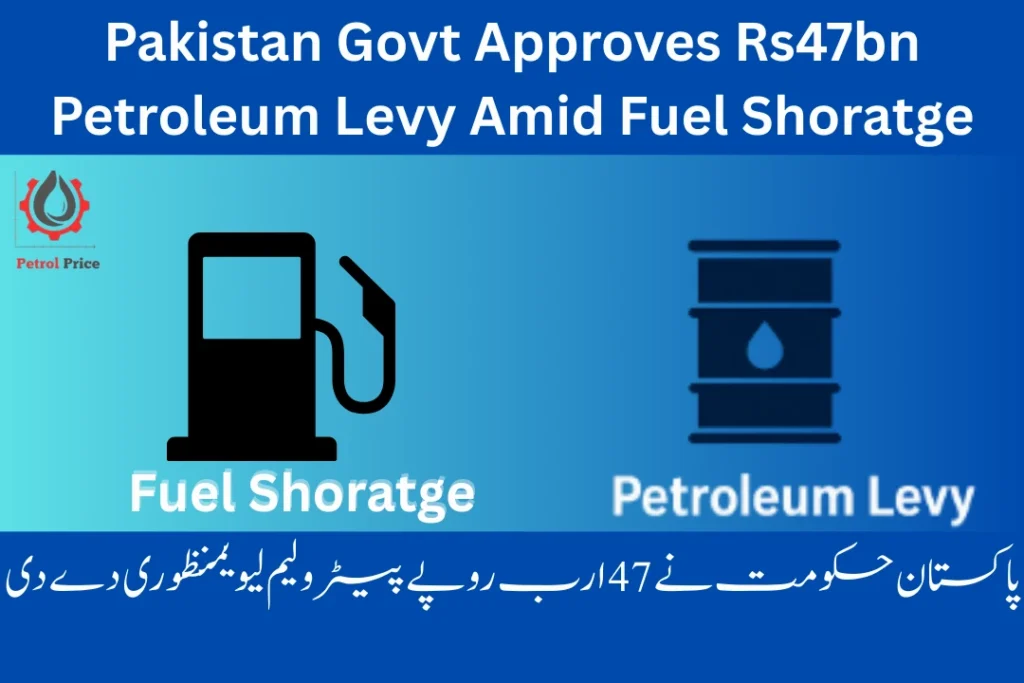Pakistan Govt Approves Rs47bn Petroleum Levy Amid Fuel Shortages
The Economic Coordination Committee chaired by the Finance Minister has approved key decisions this week related to the energy sector. One of the most significant steps is the approval of a Rs47 billion petroleum levy, aimed at stabilizing the fuel supply chain and ensuring financial recovery from outstanding dues.
Fuel Shortage (حکومت پاکستان نے ایندھن کی قلت کے پیش نظر 47 ارب روپے کے پیٹرولیم لیوی کی منظوری دے دی)
Due to heavy rain and flooding in Gilgit-Baltistan , Khyber Pakhtun khaw and other northern areas have disrupted road networks which caused difficulties for oil tankers transporting fuel. As a result several flood hit regions are facing shortages of fuel like petrol and diesel that are creating challenges for transportation and local businesses. The government has assured that measures are being taken to restore fuel supplies to the affected areas.

Read Also about : fuel Crisis in Pakistan Due to Flood
Energy Infrastructure (توانائی کا بنیادی ڈھانچہ)
In addition to shortages of fuel, the ECC has approved the tariff framework for the Machike–Thallian–Tarrujabba White Oil Pipeline, a strategic project being developed in partnership with Azerbaijan. The project will be managed by a joint company formed by Frontier Works Organization Pakistan State Oil and SOCAR (State Oil Company of Azerbaijan.
New Oil Pipeline project with Azerbaijan(آذربائیجان کے ساتھ تیل کی نئی پائپ لائن منصوبہ)
The pipeline will become the default mode of transporting oil, replacing many road tankers. It ensures full utilization of the pipeline’s capacity. Although the Finance Ministry wanted to reduce costs, ECC approved the project without cuts because of its strategic importance. The project will not only improve Pakistan’s oil supply system but also strengthen ties with Azerbaijan. The pipeline that runs from Multan to Tarrujabba near Peshawar, will serve as the primary mode of transporting petroleum products reducing reliance on road tankers. The Oil & Gas Regulatory Authority will set transportation tariffs in US dollars, ensuring fair and transparent pricing.
Current Official Fuel prices in Pakistan Today Is given
Petrol : Rupees 264.61 per liter
High-Speed Diesel : Rupees 272.99 per liter (↓ Rupees 12.84)
Light Diesel Oil (LDO): Rupees 162.37 per liter (↓ Rupees 8.20)
Kerosene Oil: Rupees 178.27 per liter (↓ Rupees 7.19)
Petroleum Levy and Energy Relief (پٹرولیم لیوی اور انرجی ریلیف)
The Rs47 billion levy recovery plan targets outstanding dues mainly from defaulters in the refining sector. The government of Pakistan intends to use these funds to support the energy sector and improve supply reliability. By strengthening financial recovery and building modern infrastructure, Pakistan aims to reduce frequent disruptions in fuel availability.
Conclusion
Pakistan is facing fuel shortages in several flood-affected areas due to damaged road links, but the government’s approval of the Rs47bn petroleum levy and the new white oil pipeline project mark important steps toward long-term energy security. These measures reflect a dual strategy of addressing immediate supply challenges while investing in sustainable energy infrastructure.
FAQ’s
Is the Government any Relief for the Flooded areas?
Pakistan Govt Approves Rs47bn Petroleum Levy Amid Fuel Shortages for country because of facing problems due to flood and road blockage .
Why Pakistan Govt Approves Rs47bn Petroleum Levy Amid Fuel Shortages?
Pakistan Govt Approves Rs47bn Petroleum Levy Amid Fuel Shortages for country because of facing problems due to flood and road blockage and heavy rain in Pakistan and The ECC approved a Rs3bn relief package for flood-hit communities in Gilgit-Baltistan, aimed at providing tents, medicines, food, and other essential supplies.
What is the Current Diesel price in Pakistan?
The current Diesel price in Pakistan is Rupees is 272.99 per liter with decrease of Rupees -12.84 per litre.

